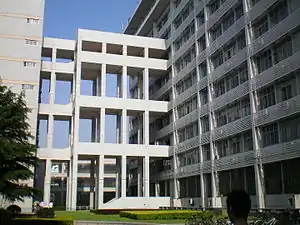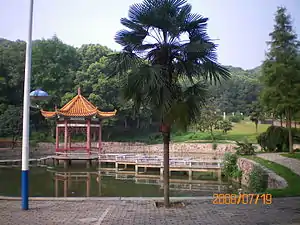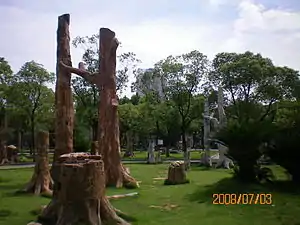China University of Geosciences (Wuhan)
The China University of Geosciences (simplified Chinese: 中国地质大学(武汉); traditional Chinese: 中國地質大學(武漢); pinyin: Zhōngguó Dìzhì Dàxué (Wǔhàn); abbreviated 地大 or CUG) is a key national university directly under the administration of the Education Ministry of the People's Republic of China. It is located in Wuhan, the capital of Central China's Hubei Province.[1] It is a Chinese state Double First Class University Plan university identified by the Ministry of Education.[2]
中国地质大学(武汉) | |
 China University of Geosciences | |
Other name | Dì Dà (地大) |
|---|---|
Former names | Beijing Institute of Geology Hubei College of Geology Wuhan College of Geology |
| Motto | 艰苦朴素 求真务实 |
Motto in English | Being austere and simple, keeping on practice and acting for truth |
| Type | National public |
| Established | 1952 |
Academic affiliations | Double First Class University Plan |
| Chairman | He Guangcai (何光彩) |
| President | Wang Yanxin (王焰新) |
| Location | Nanwangshan Mountain Compus: HubeiWuhanDonghu New Technology Development ZoneNo.68 Chenji Street 30°31′18″N 114°24′00″E |
| Campus | Urban |
| Website | www |
It is regarded as one of the top geosciences university in China and exerts considerable influence on the Chinese mining and oil industry. Its notable alumni include Wen Jiabao, the Premier of China's State Council between 2003 and 2013, who attended the China University of Geosciences when it was known as the Beijing Institute of Geology (BIG). The motto "Being austere and simple, keeping on practice and acting for truth" is from him.[1]
Campuses
Main Campus(Nanwangshan Mountain Campus)
The Main Campus of CUG is referred to as Nanwangshan Mountain Campus,because the campus was located at the foot of Nanwangshan mountain and it also has a tunnel which connect west campus and north campus running through the mountain. It has a large annual enrollment and has a wide range of courses other than geosciences.[1] Its Yifu Museum (donated by Sir Run Run Shaw) is known for housing China's top ranked displays of dinosaur fossils, mineral and rock specimens.[3]
New Campus(Future City Campus)
The New Campus of CUG was built in the Future technology city of Wuhan.[4]This campus is equipped with perfect infrastructure.
History
1952–1970,Beijing Institute of Geology
The history of China University of Geosciences dates back to Beijing Institute of Geology (BIG; simplified Chinese: 北京地质学院; traditional Chinese: 北京地質學院; pinyin: Běijīng Dìzhì Xuéyuàn) which was a merger of the geology departments of Tsinghua University, Peking University, Tianjin University and Tangshan Railway College in 1952. It was among China's first 16 key universities back in the 1950s. The university suspended operations from 1966 to 1970 due to the Cultural Revolution.

1970–1975 Hubei College of Geology
In 1970, the school reopened in Jiangling County, Hubei Province as Hubei College of Geology (simplified Chinese: 湖北地质学院; traditional Chinese: 湖北地質學院; pinyin: Húběi Dìzhì Xuéyuàn).[5]

1975–1987 Wuhan College of Geology
In 1975 the campus was moved to Wuhan, and the school was renamed Wuhan College of Geology (WCG; simplified Chinese: 武汉地质学院; traditional Chinese: 武漢地質學院; pinyin: Wǔhàn Dìzhì Xuéyuàn). In 1978 BIG reopened in Beijing with the help of Deng Xiaoping. In 1986 the Chinese Government ratified the foundation of the Beijing Graduate School of WCG. It was ranked as one of the first 33 Graduate Schools nationwide.

1987–present China University of Geosciences
Later in 1987, WCG was renamed China University of Geosciences, and its branch campus in Beijing was renamed the Beijing Graduate School of China University of Geosciences. In 2005, the two campuses in Wuhan and Beijing were separated into two individual entities and renamed China University of Geosciences (CUG) and China University of Geosciences (Beijing) (CUGB), respectively. CUG is included in the Chinese state Double First Class University Plan.[1]

Schools
- School of Earth Sciences
- School of Earth Resources
- Faculty of Material Science and Chemistry
- School of Environmental Studies
- Faculty of Engineering
- Institute of Geophysics and Geomatics
- College of Marine Science and Technology
- School of Mechanical Engineering and Electronic Information
- School of Automation
- School of Economics and Management
- School of Foreign Languages
- School of Geography and Information Engineering
- School of Mathematics and Physics
- Gemological Institute
- School of Public Administration
- School of Computer Science
- School of Physical Education
- School of Arts and Communication
- School of Marxism
- School of Li Siguang
- Institute of Higher Education
- Distance Learning and Continuing Education College
- International Education College
Laboratories
National-level laboratories
- State Key Laboratory of geological processes and mineral resources (GPMR)[6]
- State key Laboratory of Biogeology and Environmental Geology (BGEG)[7]
- National Engineering Research Center for Geographic Information System[8]
Provincial or ministerial-level laboratories
- Key Laboratory of Tectonics and Petroleum Resources, Ministry of Education
- Three Gorges Research Center for Geohazards, Ministry of Education
- Key Laboratory of legal evaluation engineering of Ministry of land and resources
- Engineering Research Center for nano mineral materials and applications, Ministry of Education
Field Training Centers
- Zhoukoudian Field Training Center, located in Zhoukoudian, Beijing.
- Beidaihe Field Training Center, located in Qinhuangdao, Hebei.
- Zigui Field Training Center, located in Zigui County, Hubei.
Journals
Image gallery
Famous alumni
- Wen Jiabao (graduated 1965, 1968), former premier of China
- Ouyang Ziyuan (graduated 1956), chief scientist of Chinese Lunar Exploration Program
- Zhang Hongren (graduated 1954), former president of International Union of Geological Sciences (IUGS)
- Wang Anshun (graduated 1983), mayor of Beijing (2012–2016)
- Wang Fuzhou (graduated 1958), Chinese mountain climber
- Wang Yongfeng (graduated 1984), Chinese mountain climber
- Li Zhixin (graduated 1985), Chinese mountaineer
- Zhang Wenyue (graduated 1967), governor of Liaoning Province
- Sun Jinlong (graduated 1982, 1986), governor of Anhui Province
- Hua-Wei Zhou (graduated 1980), American geophysicist
- Gao Ling (graduated 2004), badminton player
Notable faculty
See also
- China University of Geosciences (Beijing)
- Geology of China
- China Geological Survey
- Geological Museum of China
- Wen Jiabao
- Double First Class University Plan
- Project 211
- Project 985
- C9 League
- China Open Resources for Education
- Education in the People's Republic of China
- OpenCourseWare in China
- Worldwide Universities Network
- List of colleges and universities
- List of schools of Journalism and Communication in China
- National Higher Education Entrance Examination
- International Alliance of Research Universities
- Universitas 21
- Workshop on building top-class universities
- Worldwide Universities Network
References
- "History of China University of Geosciences".
- "教育部 财政部 国家发展改革委 关于公布世界一流大学和一流学科建设高校及建设 学科名单的通知 (Notice from the Ministry of Education and other national governmental departments announcing the list of double first class universities and disciplines)".
- "中国高校第一家4A级景区 在中国地质大学诞生了". Internet Archive. 2020-11-04. Retrieved 2023-02-27.
- "Introduction of New campus, CUG".
- (in English) History Review of China University of Geosciences Archived 2011-07-07 at the Wayback Machine
- "Introduction of GPMR, CUG (in Chinese)".
- "Introduction of BGEG, CUG".
- "Introduction of National Engineering Research Center for GIS, CUG".






